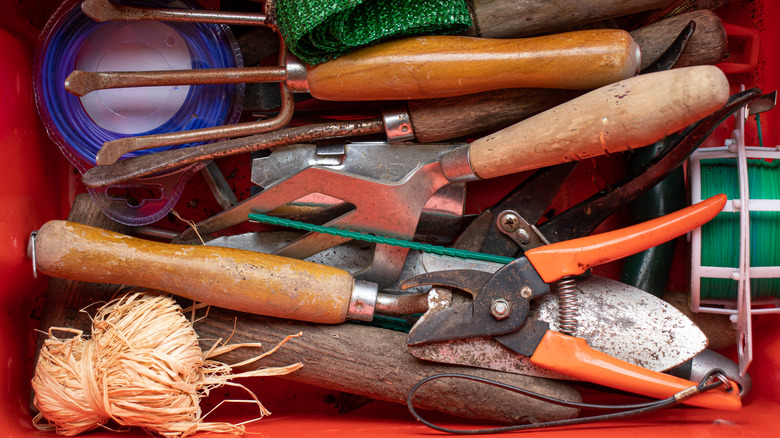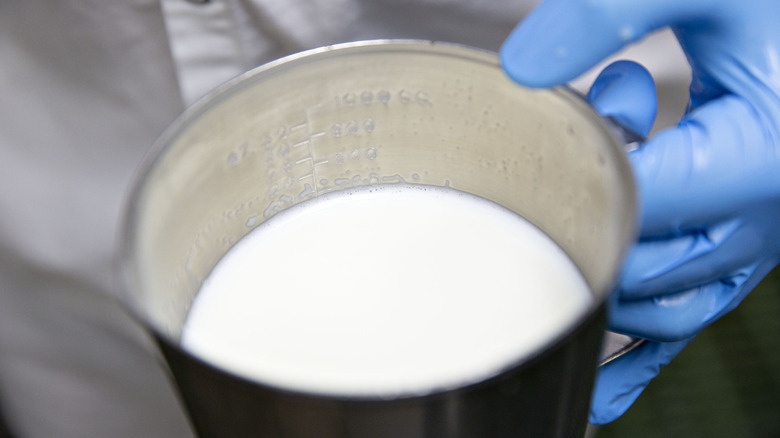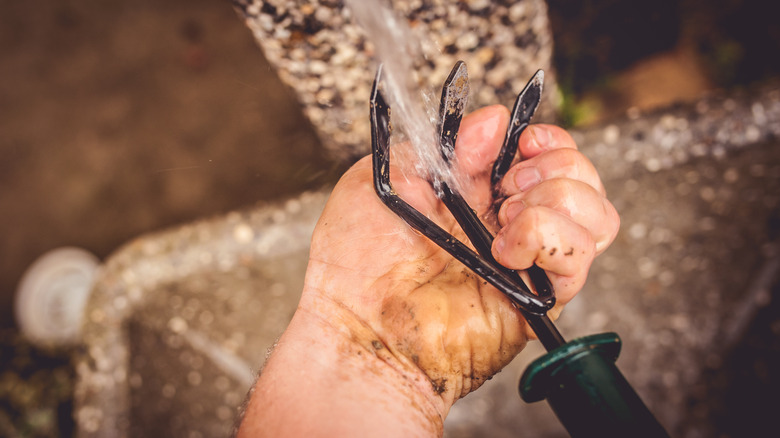The Kitchen Ingredient You Should Use To Clean Your Gardening Tools
Isopropyl alcohol or bleach are commonly used to clean and sanitize gardening tools because they're so effective at killing disease carriers, but they require a lot of caution. Because of their chemical contents, you need to handle them properly so they don't get on your skin or spill into your garden, and you have to dispose of them properly after use. There's one kitchen ingredient that can free you from these worries, however, and it's milk. By spraying your garden tools with a mix of 20% non-fat dry milk and water, the milk's organic acid will work to sterilize them.
Fungi, bacteria, and viruses can be spread among plants by pests or when spores move in the wind. They can also be transferred from unhealthy plants to healthy ones through the garden containers and tools they come in contact with, which is why they need to be properly cleaned and disinfected. Using milk in your garden in this way might sound unusual, but it is a natural and eco-friendly alternative to chemical products that is equally as effective at sanitizing but without the risk of harm. It can also help your gardening tools last longer because it slows down corrosion and rusting.
Using milk to clean gardening tools
An Ohio State University research study published in 2010 revealed that a non-fat milk and water mix provided the same results on petunia pruners as a bleach mix (via The American Phytopathological Society). The tools were contaminated with Tobacco mosaic virus (TMV), but they no longer transmitted the virus after being treated with the milk solution. If you're wondering how exactly milk works as a disinfectant, it's all in the lactic acid. Lactic acid is an organic acid that has antimicrobial properties which make milk highly effective at killing bacteria, just like traditional chemical products.
The efficacy, safety, and ease of using milk to clean your gardening tools make it a simple choice over chemical products. One less use for bleach reduces its capacity to come in contact with soils, water sources, and other parts of our ecosystem and cause harm. Isopropyl alcohol may not be as toxic, but you won't have to worry about managing its flammability and volatility. Another good thing is that non-fat dry milk is cheap and widely available, so you can easily get it if you don't already have some in your pantry.
How to do it
Before you start sanitizing your gardening tools, clean them first by running them under a stream of water to remove all dirt. If needed, use a brush to scrape off pieces of stuck-on dirt. Then, fill a spray bottle with non-fat dry milk and water. The research experiment mentioned above involved spraying the tools for 1 minute and then rinsing them under tap water for another minute. A short contact time of about 1 minute is enough to be effective, according to the study. After the rinse, air dry the tools completely and wash the container you poured the milk into to prevent bad microbial growth.
To provide additional protection against rust, you can then apply a light coating of oil or lubricant to your tools. Cleaning and sanitizing should be done before storing your tools away for the season or before you have to prune your plants, so they're good to go when you need them next.


